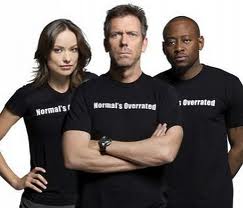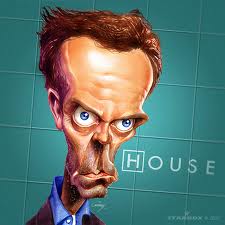From Beautiful Mind, to House, to…..
 It is interesting to see how Hollywood has portrayed mental illness in the last several years. The character of Prof. Nash in Beautiful Mind is a portrait of the power of intelligence over disease as he is willing to “ignore” those schizophrenic characters in his life than remain on medication that dulls his intellect. The film shows his efforts to fight off his demons, his multiple characters that influence him, and the struggles they create, yet in the end he dominates them, appearing to have a very “normal” life, in fact, better than normal life when receiving the Nobel Prize.
It is interesting to see how Hollywood has portrayed mental illness in the last several years. The character of Prof. Nash in Beautiful Mind is a portrait of the power of intelligence over disease as he is willing to “ignore” those schizophrenic characters in his life than remain on medication that dulls his intellect. The film shows his efforts to fight off his demons, his multiple characters that influence him, and the struggles they create, yet in the end he dominates them, appearing to have a very “normal” life, in fact, better than normal life when receiving the Nobel Prize.
 The television program House has not been afraid to have their egocentric main character, Dr. House, end up in a mental ward fighting drug addiction and his own personal pain. The hospital psychiatrist, also very intellectual, knowing his profession well, hooks horns in the battle of the intellectuals with House. At the beginning of last season, it appeared that Dr. House was making progress socially, emotionally, and psychologically, but as the season progressed, he “relapsed” into his old character again. The smartest, most successful, ingenious doctor in the hospital is allowed to be mentally quirky because of his professional results. People, particularly the staff working with him, allow him to be constantly on the edge of egotistical insanity because he is a genius. Again it appears that “intellect” can overcome insanity issues.
The television program House has not been afraid to have their egocentric main character, Dr. House, end up in a mental ward fighting drug addiction and his own personal pain. The hospital psychiatrist, also very intellectual, knowing his profession well, hooks horns in the battle of the intellectuals with House. At the beginning of last season, it appeared that Dr. House was making progress socially, emotionally, and psychologically, but as the season progressed, he “relapsed” into his old character again. The smartest, most successful, ingenious doctor in the hospital is allowed to be mentally quirky because of his professional results. People, particularly the staff working with him, allow him to be constantly on the edge of egotistical insanity because he is a genius. Again it appears that “intellect” can overcome insanity issues.
In my past several blogs I featured Kay Redfield Jamison and Elyn Saks, both are intellectuals in their own right, distinguished as leaders in their fields of expertise, who Charlie Rose is mesmerized with. He marvels that two intellectual leaders in their professions can have a mental illness yet be so highly successful. It is a marvel to many of us who have loved ones faced with an illness.
It is hard on a parent to see their child in his/her twenties stricken down with a bipolar or schizophrenic attack, or any of multiple mental diagnosis. Their dreams, as well as their child’s, are shattered, because with mental illness comes limitations. A successful father with college degrees stricken in his late forties who is reduced to be unable to hold down a simple job is disastrous. My wife, who owned and operated her own business, can no longer hold a full time or even a part time job has been a shocker to me personally.
But even Kay Redfield Jamison and Elyn Saks will admit that in spite of their successes, they still have limitations due to their disease. Learning to manage your illness, working with in the limitations presented, continuing a medication regiment needed, can all add up to a productive life. People severely ill, need our help, but most can move forward toward recovery in a productive life of independence not depending on society.
 Intelligence deals with the brain; mental illness deals with the brain. Beyond that, the similarities cease. Mental Illness strikes those highly intelligent and those with lower intelligence. Intelligence can be diminished by a mental disease. In spite of what Hollywood portrays, I find no evidence that intelligence can “overcome” mental illness.
Intelligence deals with the brain; mental illness deals with the brain. Beyond that, the similarities cease. Mental Illness strikes those highly intelligent and those with lower intelligence. Intelligence can be diminished by a mental disease. In spite of what Hollywood portrays, I find no evidence that intelligence can “overcome” mental illness.